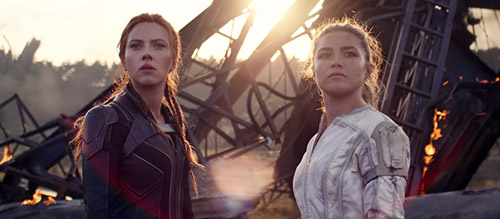Black Widow (2021) Review
Black Widow (2021)
Director: Cate Shortland
Screenwriter: Eric Pearson
Starring: Scarlett Johansson, Florence Pugh, David Harbour, Rachel Weisz, Ray Winstone
2nd July 2019. That was the last time we had a Marvel movie released on the big screen. Two whole years. That day marked the release of Spider-Man: Far from Home, a portrayal of the aftermath of the events seen in Avengers: Endgame and a movie that allowed fans of the franchise to grieve the loss of many major characters through the eyes of Peter Parker. Now, two years on, with the release of Black Widow fans can celebrate one of the many characters lost in Avengers: Endgame, Natasha Romanoff (Scarlett Johansson).
Natasha’s dark past has often been referred to in her appearances throughout the Marvel Cinematic Universe (MCU) and so Black Widow appropriately feels like a much darker entry into the franchise. This darker tone is a welcomed one and allows for the latest entry into the MCU to feel more fresh. Such a unique take also allows for director Cate Shortland to make an impact with her use of darker imagery and generally darker ideas.
Shortland’s efforts at the head of the production are severely let down by Eric Pearson’s script however, which is tonally a mess. In Pearson’s defence, Black Widow is a Marvel movie, rated 12A (PG-13), and there is only so dark a movie of this type can go, but the injections of humour into the film do come across as incredibly jarring, the two opposing tones of the film clashing in an ugly way with scenes jumping from Yelena (Florence Pugh) and Natasha describing what they had experienced in the Red Room in grim detail to goofy family melodrama. Admittedly there are a fair share of laughable moments, but these usually come at the expense of the characters, tone and any kind of deeper meaning.
Unsurprisingly this causes far more misses than hits when it comes to new characters. The biggest casualty is Natasha and Yelena’s father Alexei Shostakov/Red Guardian (David Harbour) – a Russian so stereotypical that he literally has “Karl Marx” tattooed across his knuckles and is more often than not the cause for jarring shifts in tone whilst simultaneously working as the funniest part of Black Widow – and Natasha’s ally Mason (O-T Fagbenle) – who is useful in moving certain plot points from one to another but who will also go down as one of the most painfully unfunny side characters in MCU history. Natasha’s mother Melina Vostokoff (Rachel Weisz) plays an important role in the movie and is perhaps one of the most interesting aspects of Black Widow due to Weisz’s role in a blockbuster for the first time in years, but she is sadly an incredibly dull character who does very little and is ultimately forgettable by the end. By far the greatest new addition into the world is Natasha’s younger sister Yelena Belova, adding some of the better humour into the film and overall being a charismatic character who is a welcome sidekick of sorts for Natasha. Florence Pugh is very good in the role and proves with the character of Yelena that she really can play anyone.
As for the villains of Black Widow, it seems Marvel have reverted to type by once again making any antagonists the weakest aspects of their movie. What Natasha Romanoff is taking down is seemingly more important than who, and the choreography in the fight scenes feels nothing more than run of the mill. Ray Winstone puts in a good performance as Dreykov and the character is fun, but sadly he isn’t featured enough and his impact is therefore limited to “all tell” and very little by way of things to show for it.
What Black Widow was trying to achieve is admirable: the idea of revealing more of this iconic Marvel character’s past, particularly from her era in the Red Room, opens the film up creatively and allows for much darker material than the MCU would ordinarily provide; and the film works to bring more meaning to Black Widow/Natasha Romanoff’s Avengers: Endgame death. In some ways this is present in the final product and works well, but in others it seems lost or undermined. Natasha’s end in Endgame was to many a perfect, heart-breaking end to one of the most beloved characters in the franchise. For that to be her final appearance would have worked as a sombre and emotional end. Though Black Widow brings more background to Scarlett Johansson’s franchise leader, it never quite feels essential.
Of course, Black Widow having her own stand-alone movie is a good thing, especially given that she’s only the 2nd female superhero in the MCU to do so. However, with Captain Marvel being set twenty-plus years before Endgame and Black Widow being set 7 years before Natasha would meet her demise in the same movie, it is a great shame that these long-awaited woman-fronted standalones have been nothing more than simple transitional movies within Marvel’s wider franchise output.
Black Widow isn’t all bad: Shortland directs efficiently, the performances are reasonably good (especially those of Florence Pugh and Scarlett Johansson) and some of the humour does work. However, for every hit there is a miss and although the darker side of Black Widow does make the film feel somewhat fresh, in many other ways it fails to be enough to separate this latest Marvel Studios release from your typical mid-tier entry into the MCU.
13/24


